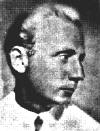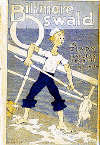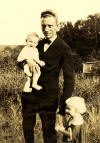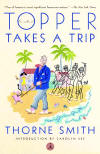|
Thorne Smith
 Once America's best-known
humor author, Thorne
Smith today is an enigma. His works are hopelessly outdated, stemming
from the late Twenties and early Thirties, and he was barely in his forties
when he died. Yet, he left behind some of the most endearing and
memorable comedies
ever penned. Once America's best-known
humor author, Thorne
Smith today is an enigma. His works are hopelessly outdated, stemming
from the late Twenties and early Thirties, and he was barely in his forties
when he died. Yet, he left behind some of the most endearing and
memorable comedies
ever penned.
James Thorne Smith Jr. was born at the U.S. Naval Academy,
Annapolis, Maryland, on May 27, 1892, the son of James and Florence (Rundle)
Thorne Smith. His father, Commodore James Thorne Smith, U.S.N., was
supervisor of the Port of New York during the First World War. His
mother was the granddaughter of coffee grower Don Jose Maxwell, the namesake
for Maxwell House Coffee.
Although little is known about Smith's early childhood, one
story claims that, following his mother's death when he was an infant, one
of his nannies took him to the Baltimore rail station. She had a
reputation for taking a "nip" every now and then, and on this day, she
became quite drunk and forgot where she'd left the baby. He was
eventually found by frantic friends and family, and Smith later attributed
his inability to arrive anywhere on time to the incident.
 As a boy in North Carolina, Smith slept in a big bed with
his smaller cousin, Almerine. Zeb, a big black dog, would crawl under the
covers with them, taking up most of the bed. Thorne and Almerine never
complained, knowing “as only children can, how much he had to contend with
during the day.” During his time in North Carolina, Smith told his
first stories and poems to his cousin and the dog. It was during this
time that Smith had his bouts with pneumonia, something that would plague
him the remainder of his life. As a boy in North Carolina, Smith slept in a big bed with
his smaller cousin, Almerine. Zeb, a big black dog, would crawl under the
covers with them, taking up most of the bed. Thorne and Almerine never
complained, knowing “as only children can, how much he had to contend with
during the day.” During his time in North Carolina, Smith told his
first stories and poems to his cousin and the dog. It was during this
time that Smith had his bouts with pneumonia, something that would plague
him the remainder of his life.
After high school, Smith enrolled in Dartmouth University,
where he was active in college life. A member of the cross-country
track team, his running probably further damaged his already weak lungs and
contributed to the heart problems he would face later in life.
Although he enjoyed his academic years, Smith felt he was missing
something; so, he dropped out of Dartmouth in June 1912 and took a job at a
New York advertising agency, writing copy for Dr. Lyon's Tooth Powder under
the name, T. Horn Smith.
 During World War I,
Smith saw an opportunity to leave the
advertising business and serve his country. He enlisted in
the U.S. Navy, where he became editor of The Broadside, a Naval
Reservist Journal that grew from 4 to 50 pages during his tenure.
It was there that he experienced his first writing success. He began
penning a
serial about a hapless Naval recruit named Biltmore Oswald. The short
stories proved so popular with the servicemen that Frederick Stokes &
Company later reprinted them as Biltmore Oswald: The Diary of a Hapless
Recruit and Out O’ Luck: Biltmore Oswald Very Much at Sea.
Oswald’s adventures sold more than 70,000 copies. During World War I,
Smith saw an opportunity to leave the
advertising business and serve his country. He enlisted in
the U.S. Navy, where he became editor of The Broadside, a Naval
Reservist Journal that grew from 4 to 50 pages during his tenure.
It was there that he experienced his first writing success. He began
penning a
serial about a hapless Naval recruit named Biltmore Oswald. The short
stories proved so popular with the servicemen that Frederick Stokes &
Company later reprinted them as Biltmore Oswald: The Diary of a Hapless
Recruit and Out O’ Luck: Biltmore Oswald Very Much at Sea.
Oswald’s adventures sold more than 70,000 copies.
Besides offering the young writer a launching pad for his
humor, The Broadside proved the ideal venue for his poetry, for which
Smith felt even more passion than for his humor.
Discharged from the Navy in 1919, he returned to
advertising--something he would do for the rest of his life whenever he
needed money. During the spring of that year, a flu epidemic swept
across the states, and Smith was stricken hard. He took months to recover.
Afterwards, he relocated to the Greenwich Village Inn, which was the home of
many literary personalities, including Harold Stearns, Sinclair Lewis, and
John Reed.
 While in the Village, Smith fell in love with local Celia
Sullivan. He called her his Mona Lisa, and they eventually
eloped to Rye, New York, that Fall. They took an apartment on Jones
Street in Greenwich Village. While in the Village, Smith fell in love with local Celia
Sullivan. He called her his Mona Lisa, and they eventually
eloped to Rye, New York, that Fall. They took an apartment on Jones
Street in Greenwich Village.
Since his poetry wasn’t paying the bills, Smith went to
work for Edward Bird Wilson, Inc., where he wrote ad copy for banking
clients. Although he was good at his job, he couldn’t stand the
corporate world. He designed an ad for a Florida bank showing a Santa
in a bathing suit enjoying the day at the beach. He enjoyed
bringing a touch of humor to his ads, which made the long workday seem that
much more bearable.
On August 23, 1920, Smith's father, the Commodore, died,
leaving the son his entire estate. Since his brother, Skyring, had a
family, Smith gave his brother the New Rochelle house. In 1921, with some
of the money he received, Smith and his wife took a vacation in Southern
France. When they returned, they purchased a summerhouse in Free
Acres, New Jersey, a Village-like center for artists and writers outside
the city limits.
Smith and Celia quickly managed to squander the remainder of
the inheritance. Neither one of them was much good at managing money,
and they were frequently in debt, something that would plague them to the
end of Smith's days and beyond. They spent much of their money on exotic
vacations, such as long cruises and European getaways.
 Smith's inability to earn a living from his writing
depressed him, and his depression led to a bout of heavy drinking. On November 14, 1922,
Celia gave birth to their daughter Marion. Two years later, on March
4, 1924, she bore a daughter, June. Although Smith loved his family
dearly, two more mouths to feed meant only one thing: back to the wide
wonderful world of advertising went Smith. Smith's inability to earn a living from his writing
depressed him, and his depression led to a bout of heavy drinking. On November 14, 1922,
Celia gave birth to their daughter Marion. Two years later, on March
4, 1924, she bore a daughter, June. Although Smith loved his family
dearly, two more mouths to feed meant only one thing: back to the wide
wonderful world of advertising went Smith.
Signing on with INECTO, he managed to stay for only
seven months. During six months of unemployment, he began
work on his most ambitious project to date, his first serious novel. His
poetry wasn’t selling well, and royalties from his Biltmore Oswald and Out
‘O Luck books weren’t enough to pay the bills, so he decided to write
Dream’s End. He finished it after months of revisions, but he
couldn't find a publisher. Dejected and despondent, he went back
to advertising once again.
Working for Doremus & Company in New York City, he wrote
copy for clients such as Schrafft’s Chocolates, Fall River Steamboat Line,
Tubize, Artificial Silk, and the Canadian National Railway. While his
work was first rate, he despised every minute he was forced to spend in the office.
 For
solace, Smith returned to drinking.
But he also kept writing. He had begun a short story about a dog
tromping through the high grass. He liked the story so much that he
expanded it into a book. It featured a middle-aged, henpecked banker
named Cosmo Topper. The book, Topper, turned out to be Smith's
greatest success. It went on to become a hit movie
starring Cary Grant and, afterwards, a popular television series featuring Leo
G. Carroll as the ubiquitous Topper. It was one of the first of the
so-called genre formula books whose ingredients for success Smith broke
down into several categories. For
solace, Smith returned to drinking.
But he also kept writing. He had begun a short story about a dog
tromping through the high grass. He liked the story so much that he
expanded it into a book. It featured a middle-aged, henpecked banker
named Cosmo Topper. The book, Topper, turned out to be Smith's
greatest success. It went on to become a hit movie
starring Cary Grant and, afterwards, a popular television series featuring Leo
G. Carroll as the ubiquitous Topper. It was one of the first of the
so-called genre formula books whose ingredients for success Smith broke
down into several categories.
The Hero
 Smith's heroes are men adrift in the world. Usually tall, thin,
and sophisticated
- "attenuated" is a favorite word - and unhappily married, the hero is pulled
against his will into ever increasingly confusing situations. He is,
incongruously, madly desired by the heroine and sometimes by other women as
well. He is never in control of events. In the end, a Smith hero
is usually better off, and certainly wiser, than before. A typical
Smith moral: Decorum and reputation may have fallen by the wayside, but
sometimes the hero is better off without them. Smith's heroes are men adrift in the world. Usually tall, thin,
and sophisticated
- "attenuated" is a favorite word - and unhappily married, the hero is pulled
against his will into ever increasingly confusing situations. He is,
incongruously, madly desired by the heroine and sometimes by other women as
well. He is never in control of events. In the end, a Smith hero
is usually better off, and certainly wiser, than before. A typical
Smith moral: Decorum and reputation may have fallen by the wayside, but
sometimes the hero is better off without them.
The Heroine
Smith's women get short shrift, with one notable exception. His
wives are usually adulterous, critical, and the least desirable women in his
books. But his heroines, on the other hand, are always the most
attractive, intelligent, and resourceful. They are also intensely
attracted to the hero and ruthless in their efforts to win him over.
Never promiscuous, but ready and eager for a roll in the hay with the hero -
more eager in fact - they are an indefatigeuable force of nature.
Other, less virtuous women may compete with her, but they don't stand a
chance.
The Fantasy
Smith clearly takes license with every man's fantasy: the desire to be
wanted by a voluptuous but monogamous woman. However, that isn't the
end to his fantasy world. Even beyond that, Smith's books are alternate worlds
in which reality is often suspended, ghosts exist, and ordinary life is
something to be avoided at all cost.
The Sex
 Although there is little sex in Smith's world, sexuality runs rampant.
Double entendres are everywhere. That was as much out of necessity as
out of choice. In Hollywood, the Hays Office was clamping down on
immorality in movies; and it wasn't until 1933 that John M. Woolsey wrote
his famous opinion that allowed James Joyce's Ulysses to be published
in the United States. As luck would have it, the implications
of sex make Smith's works that much more exciting and enjoyable than had he
used explicit sex. Although there is little sex in Smith's world, sexuality runs rampant.
Double entendres are everywhere. That was as much out of necessity as
out of choice. In Hollywood, the Hays Office was clamping down on
immorality in movies; and it wasn't until 1933 that John M. Woolsey wrote
his famous opinion that allowed James Joyce's Ulysses to be published
in the United States. As luck would have it, the implications
of sex make Smith's works that much more exciting and enjoyable than had he
used explicit sex.
The Alcohol
Smith's characters all drink. And drink. And when they are
finished drinking, they drink some more. In fact, it would be
impossible to predict just when a Smith character might not be drinking.
From sunrise to sundown, the liquor flows. Most of his books were
written during the Prohibition Era, and while Smith gives the difficulty in
obtaining illegal booze a token mention, it is rarely anything more than a
mild inconvenience to his characters.
 Although with Topper Smith had stumbled upon the
quintessential blueprint for a successful humor novel, today his works
seem hopelessly dated and more than a little out-of-keeping with society.
Nevertheless, they combine a distinctive literary voice with an undeniable
comedic gift, and that makes them as timeless as any great literature of the
world. No writer before or since has approached the world in quite the
same was as Thorne Smith, and for that his works will always be remembered. Although with Topper Smith had stumbled upon the
quintessential blueprint for a successful humor novel, today his works
seem hopelessly dated and more than a little out-of-keeping with society.
Nevertheless, they combine a distinctive literary voice with an undeniable
comedic gift, and that makes them as timeless as any great literature of the
world. No writer before or since has approached the world in quite the
same was as Thorne Smith, and for that his works will always be remembered.
Thorne Smith, who was a frequent companion of Dorothy
Parker and an immensely popular writer during his lifetime, died in 1934 at
the age of 42.
Discover Thorne Smith
at Amazon.com
Indulge
Yourself - Check Out Today's Best-Selling
Fiction -
Nonfiction -
DVDs |









